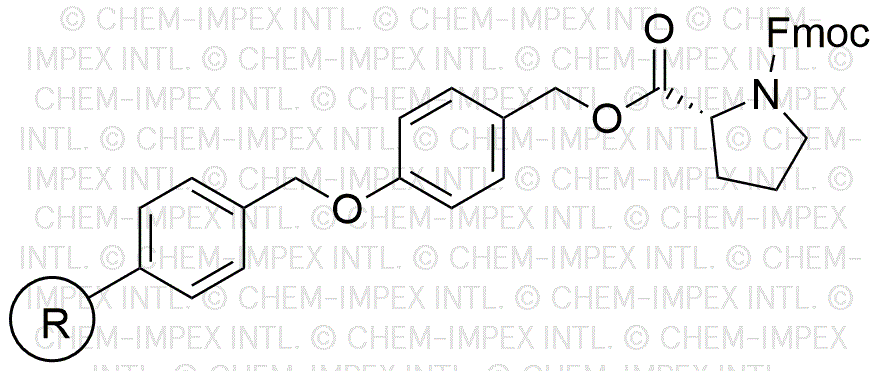Fmoc-D-proline 4-alkoxybenzyl alcohol resin is widely utilized in research focused on:
- Peptide Synthesis: This resin serves as a solid support for the synthesis of peptides, allowing for efficient coupling reactions and easy cleavage of the final product.
- Drug Development: Its application in drug discovery helps in the creation of peptide-based therapeutics, which can target specific biological pathways effectively.
- Bioconjugation: The resin can be used to attach biomolecules, such as antibodies or enzymes, to peptides, enhancing their functionality in various applications.
- Research in Neuroscience: It aids in the synthesis of neuropeptides, which are crucial for understanding brain function and developing treatments for neurological disorders.
- Customizable Peptide Libraries: Researchers can create diverse libraries of peptides for screening purposes, facilitating the discovery of new bioactive compounds.
Información general
Propiedades
Seguridad y normativas
Aplicaciones
Fmoc-D-proline 4-alkoxybenzyl alcohol resin is widely utilized in research focused on:
- Peptide Synthesis: This resin serves as a solid support for the synthesis of peptides, allowing for efficient coupling reactions and easy cleavage of the final product.
- Drug Development: Its application in drug discovery helps in the creation of peptide-based therapeutics, which can target specific biological pathways effectively.
- Bioconjugation: The resin can be used to attach biomolecules, such as antibodies or enzymes, to peptides, enhancing their functionality in various applications.
- Research in Neuroscience: It aids in the synthesis of neuropeptides, which are crucial for understanding brain function and developing treatments for neurological disorders.
- Customizable Peptide Libraries: Researchers can create diverse libraries of peptides for screening purposes, facilitating the discovery of new bioactive compounds.
Documentos
Hojas de datos de seguridad (HDS)
La SDS proporciona información de seguridad completa sobre la manipulación, el almacenamiento y la eliminación del producto.
Especificación del producto (PS)
La PS proporciona un desglose completo de las propiedades del producto, incluida la composición química, el estado físico, la pureza y los requisitos de almacenamiento. También detalla los rangos de calidad aceptables y las aplicaciones previstas del producto.
Certificados de análisis (COA)
Busque certificados de análisis (COA) ingresando el número de lote del producto. Los números de lote y de partida se pueden encontrar en la etiqueta de un producto después de las palabras "Lote" o "Lote".
Número de catálogo
Número de lote/lote
Certificados de origen (COO)
Este certificado de origen confirma el país en el que se fabricó el producto y también detalla los materiales y componentes utilizados en él y si se deriva de fuentes naturales, sintéticas u otras fuentes específicas. Este certificado puede ser necesario para cumplir con las normativas aduaneras, comerciales y regulatorias.
Número de catálogo
Número de lote/lote
Hojas de datos de seguridad (HDS)
La SDS proporciona información de seguridad completa sobre la manipulación, el almacenamiento y la eliminación del producto.
DownloadEspecificación del producto (PS)
La PS proporciona un desglose completo de las propiedades del producto, incluida la composición química, el estado físico, la pureza y los requisitos de almacenamiento. También detalla los rangos de calidad aceptables y las aplicaciones previstas del producto.
DownloadCertificados de análisis (COA)
Busque certificados de análisis (COA) ingresando el número de lote del producto. Los números de lote y de partida se pueden encontrar en la etiqueta de un producto después de las palabras "Lote" o "Lote".
Número de catálogo
Número de lote/lote
Certificados de origen (COO)
Este certificado de origen confirma el país en el que se fabricó el producto y también detalla los materiales y componentes utilizados en él y si se deriva de fuentes naturales, sintéticas u otras fuentes específicas. Este certificado puede ser necesario para cumplir con las normativas aduaneras, comerciales y regulatorias.

